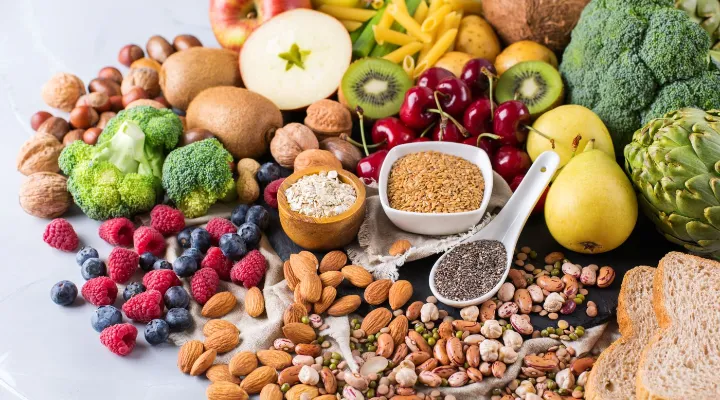Hypothyroidism requires specialist care; following the therapy prescribed by an endocrinologist can help relieve symptoms. You may also want to consider your diet and lifestyle, which you can do with Zsuzsanna Kókai, a dietitian at RMC. A healthy diet can help alleviate unpleasant or health-risk symptoms, such as obesity, abnormal blood fat and blood sugar levels, or constipation.
Is a special restrictive diet necessary for hypothyroidism?
Due to hereditary factors, hypothyroidism of autoimmune origin can often be associated with other autoimmune diseases, such as coeliac disease. If a specialist diagnoses this condition, a strict gluten-free diet is required. As this highly restrictive diet may carry multiple risks, it is recommended to consult a dietitian who can help you achieve a healthy diet.
In well-managed hypothyroidism—i.e., properly adjusted thyroid hormone levels—lifestyle factors are more likely to cause obesity. A healthy diet supports weight management, contributes to the health of the gut flora, and ensures that the body has the right vitamins and minerals while avoiding harmful dietary factors. It is recommended that the national recommendations for healthy eating (e.g., the Smart Plate® or Mediterranean diet) be followed. In the case of obesity, abnormal blood fat, or blood glucose levels, these diets may also need to be modified.
What to look out for in your diet
If you are taking medication to treat hypothyroidism, it is essential to follow a few rules, as these can help to ensure proper absorption. Medicines containing levothyroxine should usually be taken on an empty stomach, preferably before breakfast, and then wait half an hour to an hour before eating. Foods high in calcium can impair absorption, so avoid eating large amounts of dairy products now. However, dairy-free meals are not necessary. Absorption may also be impaired by certain medicines (such as stomach acid reducers) or iron substitutes. A 2-to-4-hour gap is required before taking these medicines and thyroid medicine.
Some foods contain substances that can interfere with the absorption or utilization of iodine in the body. This group of substances is called goitrogens. Cruciferous vegetables such as cabbage and broccoli contain these compounds. However, we would have to consume an extreme amount to experience adverse effects. Cooking, pouring out boiling water, or cooking without a lid can reduce the concentration of these compounds. You may need to check your thyroid hormones if you want to change the amount of soy in your diet.
Here are a few tips on dietary supplements
Always check with your doctor before taking iodine or selenium. The need for iodine depends on what is causing the underactivity. Taking too much iodine can cause harm. Hair loss or skin dryness, which may also be symptoms of hypothyroidism, can often justify taking biotin (vitamin B7) supplements. It is good to know that these can affect the results of hormone tests, so it is best to avoid taking these products for a week before taking blood samples.
To learn more about your ideal diet, please contact us for a dietetic consultation.
- pediatrics21
- dietetics20
- RMC Dental Center15
- diet13
- internal medicine11
- dentistry9
- pediatric dentistry8
- sport7
- Dr Kinga Jókay7
- coronavirus6
- screening6
- covid6
- urology6
- obstetrics gynecology6
- prevention5
- cardiology5
- allergy5
- psychology5
- dental hygiene5
- infection4
- gastroenterology4
- menopause4
- screenings3
- Kinga Jókay M.D3
- Flu shot3
- Flu3
- women's screening3
- zsuzsanna kókai2
- Dr Nóra Gullai2
- infectious disase medicine2
- Ear-Nose-Throat2
- heat stroke2
- endocrinology2
- Dr Tímea Baló2
- allergen immunotherapy2
- Adrienne Nagy M.D.2
- Fetal Medicine Center2
- pediatric urology2
- flu season2
- meningitis2
- dermatology2
- gynecologist2
- Ophthalmologist2
- Headache Clinic2
- Dr Eszter Bodnár2
- headache2
- menopause program2
- invisalign2
- diabetology2
- cardiovascular disease1
- diabetes1
- hydration1
- hematology1
- iron1
- Imre Bodó M.D.1
- Same Day Surgery Center1
- nutritional disorder1
- lyme disease1
- gynecologic oncology surgery1
- first trimester screening1
Our related doctors
Any questions before booking an appointment?
If you are unsure which doctor to see or what examination you require, we are here to help!
Simply request a free callback from one of our colleagues, who will help you find the right specialist based on your specific issue.







